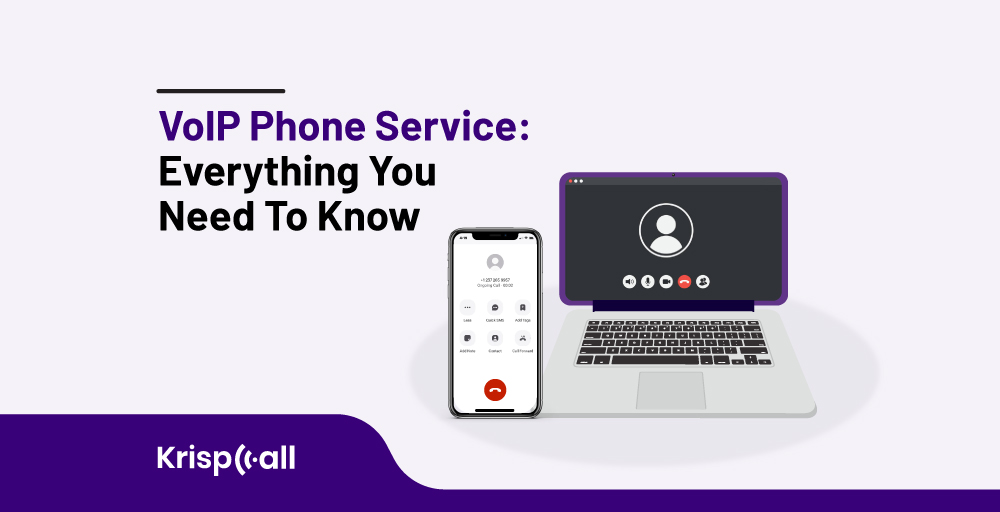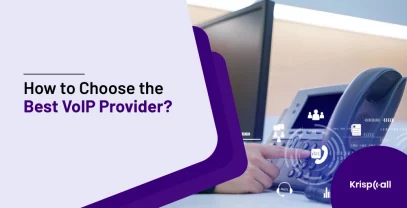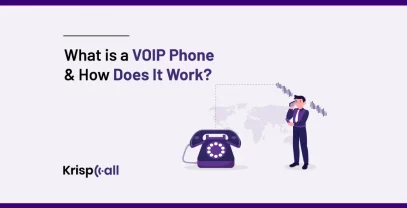Are you concerned about choosing the right VoIP phone service for your business and are looking for information to help you decide?📞
This is widely used as a new method of taking calls compared to traditional phone services, especially by small—to medium-sized businesses that wish to share information with callers.
In this blog post, learn about what VoIP phone service is, its types and functions, and how you can choose the best VoIP services for your calls. We’ve got you covered ✅.
🔑KEY HIGHLIGHTS!
- VoIP (Voice over Internet Protocol) is a technology that allows users to make voice calls using the Internet rather than traditional analog phone lines.
- VoIP phone service offers various connection types to suit business needs.
- Computer-to-computer connection is the simplest type of VoIP call, establishing a virtual link between separate PCs, laptops, and desktop computers.
- Like other telecommunications services, VoIP phone services are full-featured and offer many features that improve communication capabilities compared to traditional communication systems.
What is VoIP Phone Service?
VoIP, or Voice over Internet Protocol, is a technology for making and receiving phone calls. It works by converting the sound of your voice into digital packets, which are then transmitted through the Internet.
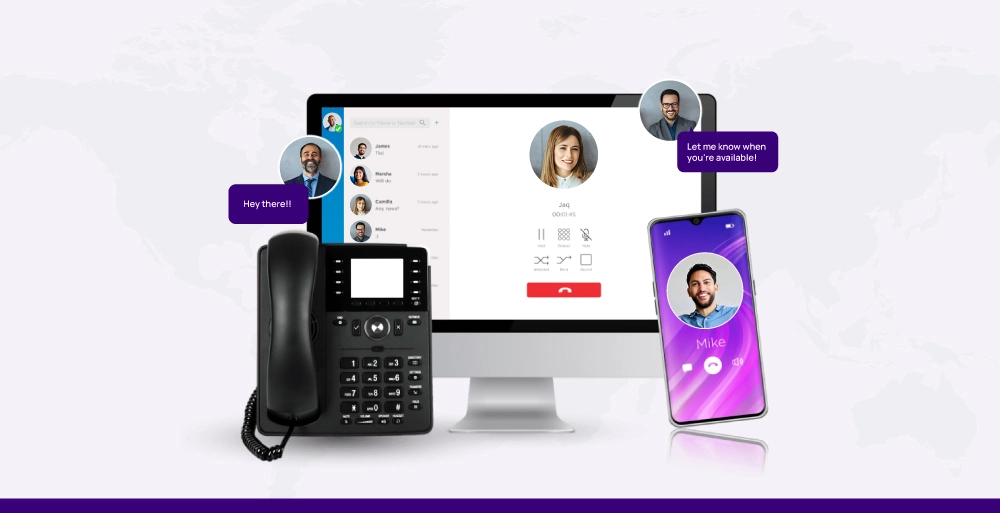
Usually, the underlying technology, VoIP, refers to a system that transmits everyday voice conversations in the form of data packets through the Internet. And VoIP works by converting the sound of your voice into digital packets transmitted over the Internet.
Traditional phone systems are a thing of the past, as VoIP providers offer voip phone systems with features like auto attendant, call routing, IP phones, and many more.
Types of VoIP Phone Service
VoIP (Voice over Internet Protocol) phone service offers various types of connection to suit business needs. Here are the four main types of VoIP connections:
1. Computer-to-Computer Connections
A computer-to-computer connection is the simplest type of VoIP call, which creates a virtual link between separate PCs, laptops, and desktop computers. This connection lets users make/receive voice calls, business text messages, chat messages, and video conferences directly in the browser or via a downloadable Voip softphone app.
2. Computer-to-Any-Phone Connections
A computer-to–any-phone connection enables VoIP communication between a computer and an IP phone and traditional analog and cell phone communication. VoIP calls are made/received via the connected phone, not the computer. IP phones connect directly to the Internet via an ethernet cable or WiFi to provide instant VoIP access alongside advanced features.
3. Mobile Softphones and Apps
Mobile softphones and apps have revolutionized how professionals communicate, enabling them to make and receive VoIP calls from anywhere in the world using their smartphones and tablets. These apps offer a range of features, including call forwarding, custom caller ID, voicemail, and call recording, making it easier for professionals to stay connected and productive while on the move.
4. Analog Telephone Adapter (ATA) for Landlines
An Analog Telephone Adapter (ATA), also known as a VoIP adapter, is a device that enables ordinary telephones, fax machines, and other customer-premise equipment to connect to a digital or VoIP telecommunication network. This is particularly useful for businesses that still rely on traditional landlines but want to take advantage of the benefits of VoIP technology.
💡 Keep in mind: Each type of VolP connection offers unique benefits and flexibility, making it essential to choose the right connection type for your business needs.
🔗 Related: Internet Phone Service: Everything You Need to Know
How Does VoIP Phone Service Work?
VoIP (Voice over Internet Protocol) phone service functions digitally, whereby voice signals are converted to digital packets and transmitted through the Internet. This means one can make voice calls using an Internet connection rather than phone lines.
Here’s a quick overview of the process:
- Analog to Digital Conversion: When a user dials someone, their VoIP phone or device takes the analog voice signal and turns it into small digital packets.
- Packetization: Packets are packetized, which means that digital data packets are chopped into segments or packets containing headers with information like source and destination IP addresses.
- Transmission: These are sent over the internet, and the call occurs through the internet protocol of the callers’ VoIP service provider.
- Routing Protocol: The end-to-end transmissions are segmented into microscopic units called packets, which may be directed to any end VoIP telephone or device at any point in the globe.
- Receiving: The packets are then received at the intended device, where the data packets are reassembled from the analog voice form.
- Playback: The caller can also listen to the analog voice signal being played at the other end of the line while calling the intended number.
📖Also read: VoIP Texting: How It Works & How It Can Benefit Businesses
Benefits of VoIP Phone Service
There are many benefits to having a VoIP phone service that would enable businesses of all types to use it. By switching to a VoIP phone service, businesses can enjoy these benefits, leading to increased productivity, improved communication, and cost savings.
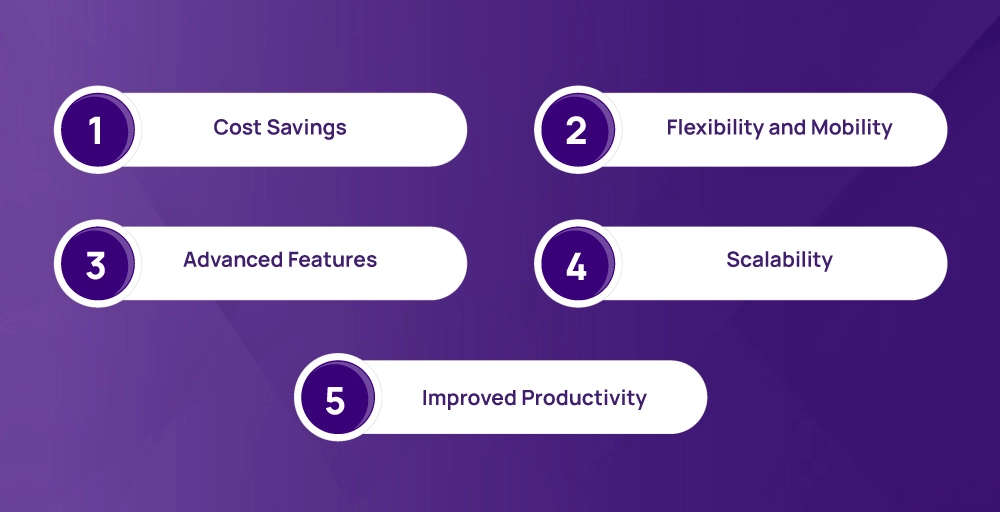
Let’s explore each of those in-depth:
1. Cost Savings
Introducing VoIP technology into your business can greatly lower your communication expenses as it uses your existing internet connection to initiate calls. Also, POTS have limitations and disadvantages, including high acquisition and installation costs, recurrent general maintenance costs, and costly long-distance calls.
Here are some other cost-related benefits of using VoIP services.
- Reduced Long-Distance Charges: You can get local, international, or long-distance calling services and VoIP numbers from many countries.
- Lower Initial Setup Costs: There is less investment in hardware than with the old-fashioned critical telephone systems, otherwise known as PBX systems.
- Predictable Monthly Costs: To manage your spending, you can acquire subscription packages from most VoIP services.
2. Flexibility and Mobility
VoIP enables employees to use their telephone line at work or anywhere else worldwide through mobile phones, notebook computers, or even VoIP terminals. This feature allows employees to stay connected and productive from anywhere, anytime, as long as they have a stable internet connection.
- Remote Work Enablement: This is especially useful for those organizations that employ telecommuters or travelers.
- Business Continuity: Never miss out on a call during a re-location or disruption in your office premises.
- Access from Multiple Devices: After reading several articles and brainstorming, the following proposal was designed to effectively determine the best approach for seamless switching between devices while adhering to the most stringent connectivity requirements.
3. Advanced Features
VoIP has several underlying features that enhance business accessibility and efficiency, such as call transfer, voicemail to mail, and video teleconferencing. These advanced features can take business communication to the next level, providing a competitive edge and improving overall productivity.
- Unified Communication: Unified communication where voice, video, and messaging can be accessed in a single interface.
- Enhanced Collaboration: Additional media such as video and screen sharing help coordinate the work process.
- Improved Customer Service: Auto attendants and call routing methods should be used to manage the flow of incoming calls from customers.
4. Scalability
VoIP technology allows the business to integrate more or fewer lines as and when needed, with little capital expense on hardware. This scalability feature is particularly beneficial for businesses that experience seasonal fluctuations or rapid growth. With VoIP, businesses can easily add or remove lines, extensions, or features as needed without expensive hardware upgrades or new equipment installations.
- Ease of Expansion: You can do more business and connect more clients with the system without having to rewire the network and make massive alterations.
- Cost-Effective Growth: The lack of financial strains means that one does not have to over-allocate resources to those not needed for a particular task.
- Flexible Plans: Flexible with its services and adjust current services per business conditions.
5. Improved Productivity
VoIP connectivity processes with other applications, minimizing the time used for the processing. This integration enables businesses to streamline communication workflows, automate tasks, and increase productivity. With VoIP, businesses can:
- Integrate with CRM systems: Automatically log calls, track customer interactions, and access customer data in real-time, enabling sales teams to focus on closing deals rather than manual data entry.
- Use video conferencing: Hold virtual meetings and reduce the need for travel, allowing teams to collaborate more efficiently and make the most of their time.
- Implement automated workflows: Set up custom workflows that automate routine tasks, such as call routing, voicemail transcription, and call recording, freeing up staff to focus on higher-value tasks.
- CRM Integration: Use the data online to enhance the services, especially during the call.
- Automated Tasks: It eliminates time from manual exercises such as voicemail to email.
- Presence Information: People using this property should know when their team members can help.
🔥 Read About How Much Does VoIP Cost in 2024? Pricing Guide
Top Features of VoIP Phone Service
Indeed, VoIP phone services, like other telecommunications services, are full-featured and offer many features that improve communication capabilities compared to traditional communication systems.
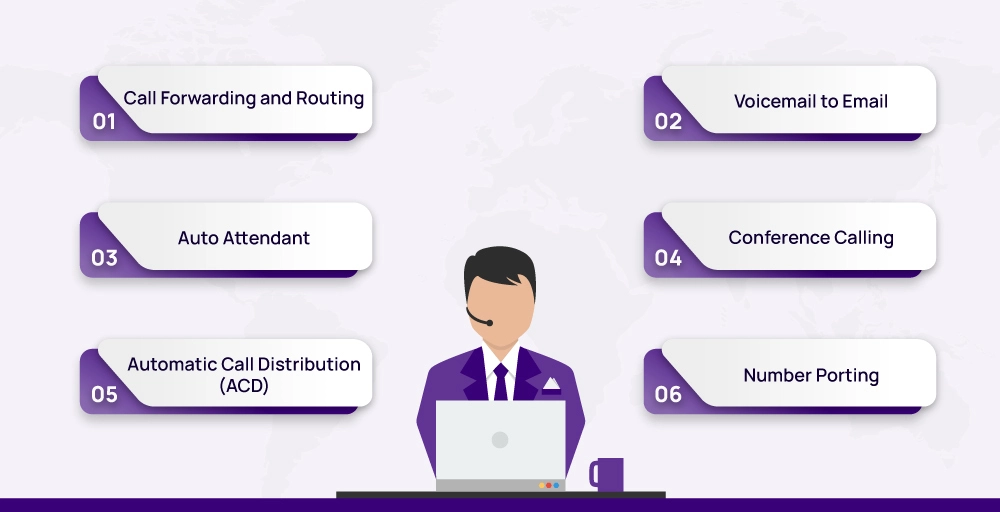
Here’s a list of the top features provided by VoIP phone services, along with explanations for each:
- Call Forwarding and Routing: Call forwarding and call routing enables calls to be connected to other numbers or devices, depending on their characteristics. For instance, if you are busy with a customer on your desk phone, the call can be redirected to a mobile phone or other personnel.
- Voicemail to Email: Voicemail to email is another service provided by many VoIP phone services in use today. It effortlessly translates voicemail into text and then sends it to an email box. This feature is beneficial in many ways, as it offers convenience, ease in audio transcribing, organization of the information, and time-saving.
- Auto Attendant: Auto attendant is similar to an automated tele-attendant, an automatic messaging system that answers calls and offers menu options to transfer calls to the correct phone extension or person. This helps increase efficiency by providing customers with an immediate response to their needs without human assistance, which is ideal for institutions handling many calls.
- Conference Calling: VoIP also comes with conference calling options, which enable more individuals to be on the same call at a given time, regardless of their geographical location. Using conference calling services is beneficial when conducting business meetings, collaborative work, or even talking to clients, allowing communication between different teams situated on various premises.
- Automatic Call Distribution (ACD): Automatic Call Distribution (ACD) is a sophisticated feature designed to manage incoming calls within an organization intelligently. By guaranteeing that calls are directed to the most suitable agents or departments according to predetermined criteria, this feature maximizes efficiency and improves the general customer experience.
- Number Porting: Business Number Porting allows users to transfer or port their existing phone numbers seamlessly from one service provider to another. This functionality enables businesses and individuals to maintain their established phone numbers while benefiting from their new provider’s services.
How do you choose the best VoIP phone service for your business?
Selecting the right VoIP phone service for your business involves several key considerations to ensure it meets your needs and enhances your communication capabilities.
Here are the main factors to consider:
- Business Needs: Identify your business’s specific communication requirements, such as the number of users, call volume, and features needed (e.g., video conferencing, call forwarding).
- Features and Integrations: Consider the features you need, such as auto attendants, call recording, and integrations with other business tools (e.g., CRM, helpdesk).
- Customer Support: Evaluate the provider’s customer support, including availability, response times, and support channels (e.g., phone, email, chat).
- Pricing and Cost: Compare pricing plans and calculate the total cost of ownership, considering any additional fees or charges.
- Reputation and Reviews: Research the provider’s reputation, read reviews from other businesses, and check ratings from independent review sites.
- Scalability: Choose a voip phone service provider, like KrispCall, that can scale with your business, offering flexible plans and easy upgrades or downgrades.
- Security: Ensure the provider has robust security measures, such as encryption, firewalls, and secure data centers.
👉 Take a closer look at this: VoIP Advantages and Disadvantages: Comparison Guide
Drawbacks of VoIP Phone Service
Businesses may opt to use VoIP phone services because of their many benefits. However, certain drawbacks must also be considered.
Below is a detailed look at some factors that might make VoIP insufficient.
1. Dependence on Internet Connection
VoIP depends solely on internet connectivity to work, so the quality of the internet connection it requires is paramount. VoIP telephone service is also heavily dependent on an internet connection; if your internet is unavailable, your phone service will be as well.
VoIP service’s dependence on the internet can lead to the following:
- Service Interruptions: If a user’s Internet connection has problems, such as interruptions or low speed, these will affect the user’s calls.
- Quality Variability: Slow and interrupted internet connections can result in problems such as call drops, latency, and low sound quality.
2. Power Outages
Copper wire phones are usually operated during a blackout because they are operated by the phone line rather than an electrical circuit. Since VoIP phones require a power source and the Internet, they would be affected by power outages, Internet disruptions, or other disasters.
Here’s what it can come down to:
- No Power, No Phone: If you are a VoIP user and power failures occur, you do not have a standby power source, your phone cannot function.
- Requirement for Backup Solutions: It’s also important to recognize that, depending on your business, activities may need to continue during a power outage, so you might need UPS or generators.
3. Emergency Call Limitations
The use of VoIP interconnecting services in emergency calls such as 911 is usually potentially limited. With VoIP phone systems, it is always difficult to track an individual’s location, especially if that person is constantly on the move or if their working environment allows them to be constantly on the move.
It can come down to:
- Location Inaccuracy: Not calling the emergency number from a VoIP phone is vital since the service does not always give the caller’s exact location.
- Service Unavailability: One disadvantage is that depending on the VoIP provider’s capabilities, essential emergency call services such as 911 may not be available in some instances.
👍 Read About Best business phone services that are affordably cheap
Get an Advanced VoIP Phone Service with KrispCall
Communication efficiency has become more critical as the social business environment has extended worldwide. This is why you should encourage yourself to acquire the best VoIP phone service that could offer more than expectations—introducing KrispCall. This modern VoIP phone service boosts your business communication with its exceptional features and benefits.
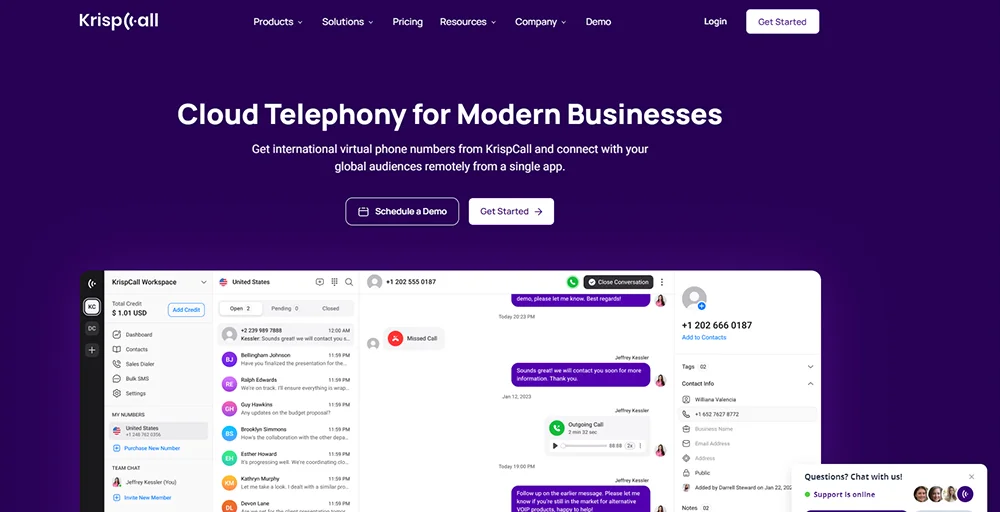
With KrispCall, you can enjoy unique VoIP features like a unified callbox, global calling, voicemail transcription, shared phone number, call forwarding, call barging, live call monitoring, and many more. You only have to purchase a virtual phone number to access and use these features in your business, gaining many benefits from VoIP service.
Some of its benefits in KrispCall are a centralized interface for all telephony conversations in a single window, effective international communications, the same number used by multiple individuals, easy voicemail messaging, and many more.
With all these benefits, it is one of the best VoIP service providers. Therefore, get yourself a Krispcall phone service to access all these features at a very affordable price of $15 per user per month.
Try KrispCall today and experience the power of VoIP for yourself! Sign up for a free demo and see how KrispCall can transform your business communication.
Conclusion
Using VoIP phone services is really helpful for businesses to make/receive calls and video conferences through the internet to improve work efficiency and save money compared to traditional phone services. With this service, businesses can access many features, such as global calling, customer caller ID, virtual phone numbers, call whispering, etc., to their benefit.
However, there are also some potential downsides to VoIP, like call quality getting weak if the internet connection gets lost or these calls can get hacked because they are made through an internet connection.
Businesses need to choose a more secure VoIP service provider. One great option is KrispCall, which is very secure and offers many benefits at an affordable price.

